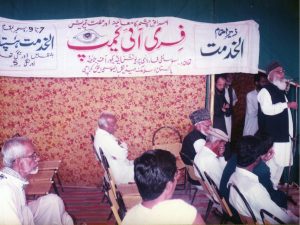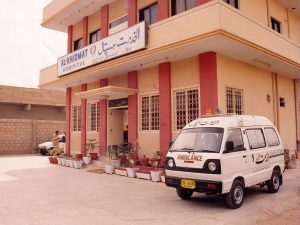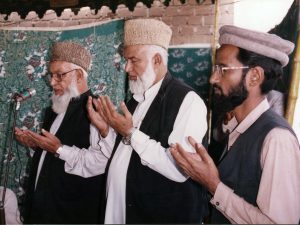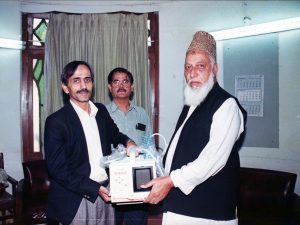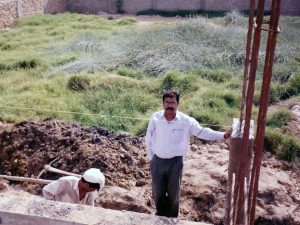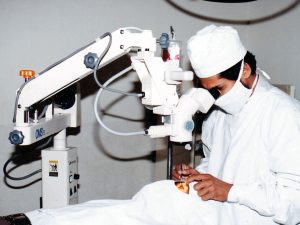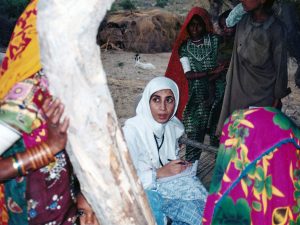SERVING PEOPLE, ONLY TO PLEASE ALLAH
Orangi Town, located in the city’s district west, is the biggest shanty town (katchi abadi) of the country. This area was already a bit populated from the 1960s, but it saw extraordinary growth in 1971 when empty-handed migrants arrived in Karachi following the Dhaka fall, and the provincial government took steps to house them in the neighborhood. The JI played an unforgettable role in this regard. The Delhi Punjabi Saudagaran, the Chiniot and Memon communities, and people of every school of thought donated generously, following in the footsteps of the ansar-e-Madina. The majority of the migrants were empty-handed but they were the people of integrity; they would sleep on an empty stomach than to ask for money or help.
There was no water, power, gas, or public transport. Those were the early days of development, so there was no question of schools or hospitals. Prof. Ghafoor Ahmad would take Munawar Hassan sahib along at Fajr and secretly extend help to the people in need. He would also review the several hundred houses being built by JI in the Sector 11 ½. Usman Ramz, Dr. Mubeen Akhtar, Dr. Athar Qureshi, Ashraf Awan, Hakim Uzair Baig Qasmi, Nisar Ahmad and hundreds of other workers who would always be engaged in reaching out to migrants. I had the honor of being one of them. JI’s welfare department was working in a very organized way, with no discrimination whatsoever. It was being done without causing them embarrassment, as per the teachings of Qur’an and Sunnah. Great care was taken to safeguard the self-respect of those who were being helped. JI Karachi, during those days, acquired an amenity plot in Orangi Town’s sector 5 from the Karachi Development Authority (KDA) to build a welfare hospital. The total area of the plot exceeded four acres. Later on, some of it was occupied and JI could hardly get an adjacent plot on court orders.
Al-khidmat Welfare Society
In 1975, a 100-bed hospital was envisaged for this plot and it was the party’s largest project in the health sector of the city. A separate organization, namely Al-Khidmat Welfare Society was registered under the Societies Act 1860 XXI on July 27, 1976 to execute the plan. Its office-bearers included Prof. Surgeon Noor-e-Ilahi (President), Naimatullah Khan (Vice President), Dr. Iftikhar Ahmad (General Secretary), Dr. Abdul Majeed (Treasurer), Dr. Iqbal Ghayoor (Joint Secretary), and Abdul Rehman Chapra, Fazl Mubeen Ahmad, Dr. Athar Qureshi, Iftikhar Ahmad, Hakim Muhammad Iqbal Hussain, Mahmood Ahmad Madni, Muhammad Junaid Farooqui, Dr. Qazi Mahfooz-ul-Hasnain Jalisi, and Usman Ramz as members. The office-bearers of JI and the newly established Al-Khidmat were really passionate about this project. The services of a renowned architecture company were acquired that prepared the design and model of the project. Dr. Abdul Majeed’s is pertinent to mention here. He was the owner of the Nabiqasim Pharma and had also served Dow Medical College as a lecturer. One of his students was a Saudi national who was later appointed as the Director Health there.
Saudi ruler Shah Khalid bin Abdul Aziz wished to build a hospital in Orangi Town for the East Pakistan migrants. He had also spoken with Maulana Maududi in this regard and initially sent an amount as well. The project was proposed to be named Shah Khalid Hospital, with an introductory brochure published too, but it suffered extraordinary delay due to the occupation and subsequent litigation. A few years later, a delegation comprising Dr. Abdul Majeed, Dr. Iqbal Ghayoor, and I was sent to Saudi Arabia to seek a financial aid for the project, but by that time, Shah Khalid had passed away and Dr. Majeed’s student had ceased to be the Director Health. The delegation returned empty-handed. In 1979, after the local body polls and the election of Abdul Sattar Afghani sahib as mayor, JI’s high-ups got so busy in running the city’s affairs that they couldn’t lay focus on the project anymore.
Al-khidmat Hospital, Orangi Town
During the 1990s, Abdul Rasheed Baig sahib proposed building a madrassah on the piece of land and got its design made after approval from the nazm, but then something else came up in 1992. Dr. Faiyaz Alam, who was very active then in the Pakistan Islamic Medical Association (PIMA) and was a member of its central shura, proposed that a specialist clinic and diagnostic center be built on the land with assistance from PIMA. Usama Ismail Murad, Al-Khidmat Karachi’s general secretary, told Dr. Faiyaz and Dr. Aurangzeb (naib qayyim of district West and a resident of Orangi) that Al-Khidmat Karachi wasn’t interested in building the hospital, but the plot can be handed over to JI district West and then “you can work on the project together”. Dr. Faiyaz had made it his mission to ensure that the project saw the light of day. Finally, I formed a committee after speaking with Ashraf Awan, amir of district West and appointed Dr. Faiyaz as the project secretary.
The committee comprised Ashraf Awan (Patron), Dr. Faiyaz Alam (Project Secretary), and Muzaffar Ahmad Hashmi, Akhlaq Ahmad, Dr. Syed Ahsanullah, Dr. Zaiuddin Sabri, Abdul Ghaffar Umar, Dr. Tabassum Jafri, Sifat Ahmad Siddiqi, Dr. Aurangzeb, and Ishaq Khan as its members. I had made it clear that Al-Khidmat Karachi would not provide any finances for the project and committee will have to collect donations on its own. Besides, those days, Al-Khidmat Karachi relied on the proceeds of the charm-e-qurbani campaign for its annual budget, and Altaf Hussain’s violence-ridden politics had made it difficult to do even that. It was commonplace to collect the hides forcibly or snatch them from the workers of other parties. This especially caused harm to madrassas and organizations like Edhi Trust. Al-Khidmat’s campaign would enable it to meet the financial needs of several of its projects.
On one side of the plot was JI’s district office, which also had a room dedicated for an Al-Khidmat clinic. This clinic was set up on an emergency basis in 1991 over the reports that Muhajir Qaumi Movement’s MNA Saleem Shazad wanted to demolish the office with the aid of government departments, on the pretext that the JI had set up its office on a plot meant for a welfare hospital. The nazm (decision-making body) and JI workers thwarted every ploy to occupy the land. The medical services were initiated by Dr. Aurangzeb. Later on, Al-Khidmat set up a booking office for the hearse driving. Dr. Zakiuddin Sabri, one of the members of the hospital committee, belonged to the field of ophthalmology. He began a free of cost, once-a-week eye care section at the clinic.
Its name was changed to Al-Khidmat Hospital, with the design for the first phase finalised. At this stage, Engineer Tasneem Qazi, a JI rukn from Nazimabad, coordinated for the project with his technical expertise. In terms of financial aid, Majeed Ahmad Abbasi, brother-in-law of the party’s North Nazimabad zone amir Ansar Razi, contributed a very handsome amount for the project. Likewise, PIMA Karachi chapter president Dr. Ahsanullah, Mian Tanveer Ahmad Magoon of Pakistan Business Forum, Saeed Ismael, Malik Naeem, Liaquat Abdullah, and Muhammed Arif not only contributed financially but collected donations from others, too. General (retd) Muhammad Umar’s son Munir Kamal, who was at the time serving Faysal Bank as its country head, also came forward with an aid.
Moreover, Shamsuddin Khalid Advocate talked to Syed Taneem Wasti, a Muslim Aid trustee and his dear friend. Subsequently, in 1994, Muslim Aid donated several lacs for the ophthalmology department. Tanzeem Wasti was a close friend of both Syed Munawar Hassan and Muzaffar Hashmi, and was a founding member of UK Islamic Mission, the representative organization of British Muslims. Wasti sahib had been living in the UK for long, but he would visit Karachi once or twice a year, and that’s when he would hold a meeting at the Idara noor-e-haq. In the days to come, the Muslim Aid became a partner organization of Al-Khidmat and contributed generously for many projects. The JI women wing took special interest in the project and ran a massive campaign for fundraising, and a vigorous extension of the hospital followed. The tradition of free eye camps is quite established now, but it was a new activity for Al-Khidmat back then. A three-day free eye camp was organized at Al-Khidmat Hospital Orangi from December 7 to 9, 1994. It was the first eye camp of the organization where patients were operated upon for cataract, glaucoma, and anisometropia and lenses were applied to some of the cataract patients. This camp was organized after collaboration between Pakistan Islamic Medical Association and Society for the Prevention and Cure of Blindness. Dr. Shahnawaz Mun’ami and Dr. Zakiuddin Sabri were the main organizers behind the activity.
In 1996, the Orangi hospital saw a new development, which was the setting up of a section for women. Dr. Faiyaz Alam’s wife Dr. Siddiqa began a gynecology clinic. Dr. Siddiqa’s fathar Fazlullah Hussaini was also a rukn of JI district central. It was the first gynecology clinic in any set up of Al-Khidmat Karachi. Also, no woman had previously served any department of the organization. The number of women quickly rose in a short span.
![]()
